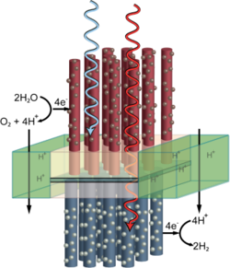Artificial Photosynthesis II - Joint Center for Artificial Photosynthesis (JCAP) Simulations

Schematic of a photoelectrochemical cell being designed to harness sunlight for generating chemical fuel. A myriad of simulation-based investigations are required to help understand, design, and fabricate its components.
Key Challenges: The goal of this project is design of a photoelectric cell capable of producing fuel at 10 times the efficiency of natural photosynthesis. Such a device will harness sunlight to generate chemical fuel by splitting water to generate hydrogen. The project employs several types of molecular simulations to help understand the processes involved and guide experimentation taking place simultaneously. Specific tasks include study of the following components: (1) Light absorber: finding semiconductor materials with sufficient light absorbing ability and output potential for water splitting; (2) Catalysis: finding efficient and Earth-abundant molecules to speed up the process of hydrogen evolution; (3) Membranes: finding the right material and fabrication routes for the multifunctional membrane that is the key ingredient in a photoelectrochemical cell; and (4) Linkers: finding the right molecules to sculpt the flow of sunlight and heat, enabling light conversion to electrical and chemical energy with unprecedented efficiency.
Why it Matters: In a single hour the sun heats the earth with enough energy to power human activities for an entire year. Through photosynthesis, green plants collect solar energy and use it to convert carbon dioxide and water into chemical energy that is used to carry out the processes of life. Finding an artificial version of photosynthesis through specialized membranes made from nanoengineered materials that can do what green leaves do - only much more efficiently - and for the purpose of producing fuels for cars and trucks could replace gasoline and other transportation fuels as a domestic source of energy that’s clean, green and renewable.
Accomplishments: The JCAP Center-North at the Berkeley Lab, a five year project funded by the U.S. Department of Energy (DOE) through its “Energy Innovation Hubs” program, was inaugurated June 2, 2011. NERSC users have been running VASP and LAMMPS on Hopper and Franklin in support of JCAP activities.
Prinicpal Investigators: Nathan Lewis (Caltech), Lin-Wang Wang (LBNL), and David Skinner (NERSC)
More Information: See the article about JCAP in Today at Berkeley Lab and Professor Nathan Lewis' web site.







